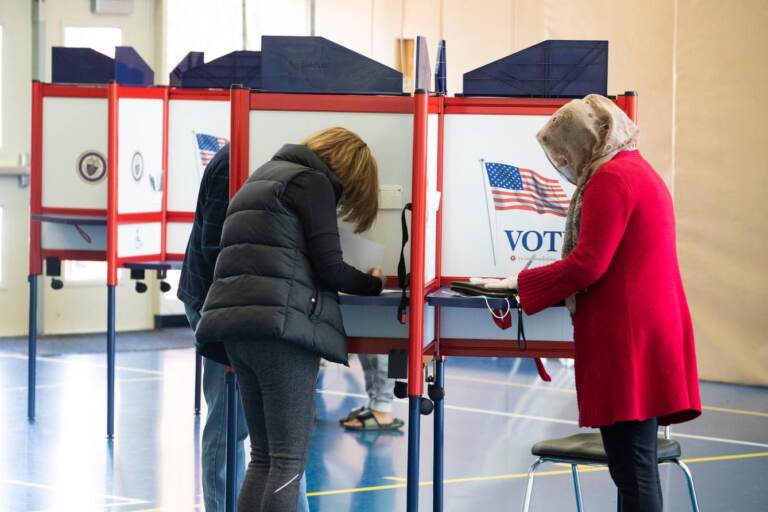Delaware County rejected voters’ flawed mail ballots. Then it refused to count their in-person votes
While the legal dispute only involves roughly a half-dozen voters, it could have implications statewide.

Voters at Nether Providence Elementary polling location in Delaware County, Pennsylvania on Election Day 2020. (Charles Fox/Philadelphia Inquirer)
This story originally appeared on Spotlight PA.
Delaware County disenfranchised a handful of eligible voters in the May primary by rejecting their provisional ballots, based on an allegedly incorrect interpretation of state law, the American Civil Liberties Union of Pennsylvania argued in a new lawsuit.
Following the May 16 primary, Delaware County’s Board of Elections decided not to accept provisional ballots cast in person by voters who had already been told their mail ballots were rejected due to technical defects. That means that these voters were twice rejected, after trying to remedy their mail ballot mistake by voting provisionally at their nearby polling places, and ultimately were unable to have their ballot counted.
While the legal dispute only involves roughly a half-dozen voters, it could have implications statewide for whether voters whose mail ballots get rejected have the chance to vote by other means.
The dispute hinges on a contradiction between Pennsylvania’s vote-by-mail law and the state’s statute governing provisional voting, which, if not resolved, has advocates concerned that it could be used as a way to disenfranchise voters in future elections.
“We need clarity in the law on this,” said Marian Schneider, senior voting rights policy counsel at the ACLU of Pennsylvania. “I think that the intent was to prevent double voting, but there’s an inconsistency with the earlier version of the statute, and as we said in our petition the courts should reconcile that statute.”
At a Delaware County election board meeting last month, the board members said that while they felt these ballots should be counted on principle, they were not accepting six provisional votes because the state’s mail voting statute, and established case law, prevented the county from doing so. The county pointed to a 2020 case from the state’s Commonwealth Court, though there was disagreement about whether that case set a binding legal standard.
“If we received a mail-in ballot that has a fatal flaw, it only makes sense that they should be able to cast a provisional ballot,” elections director James Allen said at a May 23 meeting of the board. “However, we have this Commonwealth Court ruling that says ‘you shall not do that.’ We don’t have any liberty to just make our own rules.”
Provisional ballots are given to people whose eligibility to vote is in question when they check in at a polling place. Election officials withhold those ballots from being counted until eligibility can be confirmed.
The provisional ballots came from voters who had requested and returned a mail ballot, but had that mail ballot canceled by the county due to defects before the vote was tallied. By law, counties cannot count mail ballots which lack a signature, proper date, or are returned without being placed in a secrecy envelope, though a case making its way through the federal courts may change that.
The total number of twice-rejected voters in the May primary is small, largely because Delaware County’s municipal primary was a low-turnout, off-year election. In a presidential or midterm election year, the number of twice-rejected voters under this policy could be much higher.
In last year’s midterm elections, more than 16,000 Pennsylvania voters had their mail ballots rejected for such reasons, including more than 900 in Delaware County.
The county notified voters whose mail ballots were rejected ahead of primary day and gave them the opportunity to come to the election office, in Media, to fix their errors. But in two examples, the ACLU said its clients’ age made traveling to the election office difficult compared with going to their local polling place on election day.
Those voters and at least four others cast provisional ballots at their voting precincts after being notified of their mail ballot’s defect, according to the ACLU. The ACLU also claims a county employee advised two of the plaintiffs to use the provisional ballots. A provision in Act 77, the 2019 law that established no-excuse mail voting in Pennsylvania, says “a provisional ballot shall not be counted if … the elector’s absentee ballot or mail-in ballot is timely received by a county board of elections.”
But in the ACLU’s petition to the Delaware County Court of Common Pleas — which asks the courts to compel the board to count the ballots — the organization argues that another portion of the statute takes precedence. That section says that as long as a voter is eligible to vote, their signature on the provisional ballot envelope matches their registration, and they have not “cast” another ballot, their provisional ballot “shall” be counted. “Cast” is the key word, the ACLU argues.
“We’re not encouraging double voting, but if the timeliness of the receipt of the mail ballot is not the end of the story, it has to be counted,” Schneider said.
To “cast” a ballot means for it to be counted, the ACLU argues, and voters who have their mail ballots canceled by definition did not have it counted.
Other counties, and the Department of State, appear to interpret the conflict between the statutes the same way the ACLU does. Schneider, as well as election administrators contacted by Votebeat and Spotlight PA, were unaware of any other counties taking Delaware County’s approach.
Nick Custodio, deputy city commissioner in neighboring Philadelphia, said the city counts provisionals cast under the same circumstances.
The Pennsylvania Department of State’s official website advises voters to vote provisionally if they “returned a completed absentee or mail‐in ballot that was rejected by the county board of elections,” although members of the Delaware County Board of Elections said they felt this advice was misleading because of case law on the matter.
The Department of State declined to comment specifically on the ACLU’s case, but said it was monitoring the litigation and would update its guidance if there is any authoritative court ruling. The guidance on the department’s website remained the same as of the time of publishing.
The clause in Act 77 regarding provisional ballots for mail voters with ballot defects was the basis of a 2020 Commonwealth Court decision involving voters from Allegheny County. In that ruling, the court found that provisional ballots cast by voters with defective mail ballots should not be counted.
Much of the dispute between the ACLU and Delaware County comes down to whether the 2020 ruling set a binding legal standard, known as a precedent.
Schneider and the board’s attorney went back and forth at the board’s May 23 meeting on whether the decision in the 2020 case from Allegheny County carries the weight of legal precedent.
A spokesperson for Pennsylvania’s court system said the decision was “an unreported memorandum opinion (i.e., unpublished),” meaning it does not have the same precedential value as a reported or published opinion.
A spokesperson for the county said that even though the board felt the ruling in question is incorrect, the board members voted to follow the law as they understood it.
“It is not for the Board to ignore court rulings it does not like,” said spokesperson Adrienne Marofsky in a statement to Votebeat and Spotlight PA. “Rather, the Board will litigate this matter with the goal of seeking clarity from the courts of Pennsylvania on this important issue.”
Lawyers with ties to former President Donald Trump have signaled the provision could be the basis for litigation in future elections for federal races.
A law firm composed of two attorneys who helped handle 2020 election cases for Trump and the Pennsylvania GOP — Pittsburgh-based Gallagher Giancola — sent a letter to counties last fall on behalf of the Republican National Committee stating that they intended to challenge such ballots, according to a copy of the letter obtained by Votebeat and Spotlight PA.
“The RNC intends to challenge the provisional ballots cast by voters who also cast an absentee or mail-in ballot, even if such absentee or mail-in ballot has been deemed unable to be counted under applicable law,” the letter read. It appears such challenges never materialized.
State regulators are also interested in resolving the discrepancy. At a recent meeting of the Joint State Government Commission’s Election Law Advisory Board, member Christina Iacono brought up the Delaware County situation and said it was something the board should consider addressing and issuing a legislative recommendation.
Schneider, the ACLU’s attorney, said it would be best to have ambiguities like this resolved before the next presidential election, which is why the ACLU is pursuing the case.
“I do think Delaware County is incorrect in their analysis, but we do need the courts to weigh in,” she said. “This is an important issue to get clarity on.”
The case will first need to be decided on by a Delaware County judge before it could potentially be appealed up to a high court and set precedent. The county has yet to file a reply brief to the ACLU’s petition.
 Spotlight PA is an independent, non-partisan newsroom powered by The Philadelphia Inquirer in partnership with PennLive/The Patriot-News, TribLIVE/Pittsburgh Tribune-Review, and WITF Public Media.
Spotlight PA is an independent, non-partisan newsroom powered by The Philadelphia Inquirer in partnership with PennLive/The Patriot-News, TribLIVE/Pittsburgh Tribune-Review, and WITF Public Media.
WHYY is your source for fact-based, in-depth journalism and information. As a nonprofit organization, we rely on financial support from readers like you. Please give today.






